
English_books / New Headway int sb
.pdf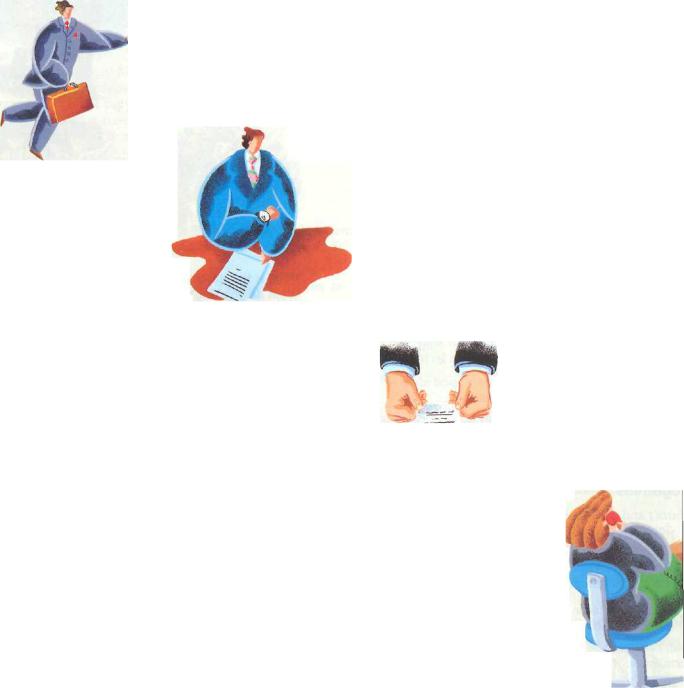
Reading
Look at the title of the article. Do you think the article will be serious or light-hearted? Why?
First read the article quite quickly. All the nationalities on page 39 are mentioned.
1 Write down one thing about each nationality that yo can remember.
2Share what you have written with other students in t class.
A World Guide to
Good Manner
How not to behave badly abroa
by Norman Ramshaw
|
Travelling to |
all |
corners |
|
|
||
|
of the world gets easier |
|
|
||||
|
and easier. We live in |
|
|
||||
|
a |
global village, |
but |
|
|
||
5 |
how well do we know |
|
|
||||
|
and |
understand |
each |
|
|
||
|
other? Here is a simple test. |
|
|
||||
|
Imagine you have arranged |
|
|
||||
|
a meeting at four o'clock. What time should you |
||||||
10 |
|
expect your foreign business colleagues to arrive? |
|||||
|
If they're German, they'll be bang on time. If |
||||||
|
they're American, they'll probably be |
15 minutes |
|||||
|
early. If they're British, they'll be |
15 minutes late, |
|||||
|
and you should allow up to an hour for the Italians. |
||||||
15 |
When the European Community began to increase |
||||||
|
in size, several guidebooks appeared giving advice |
||||||
|
on international etiquette. At first many people |
||||||
|
thought this was a joke, especially the British, |
||||||
|
who |
seemed |
to |
assume that |
the |
widespread |
|
20 |
understanding of their language meant a |
||||||
|
corresponding understanding of English customs. |
||||||
|
Very soon they had to change their ideas, as they |
||||||
realized that they had a lot to learn about how to behave with their foreign business friends.
25For example:
•The British are happy to have a business lunch and discuss business matters with a drink during the
meal; the Japanese prefer not to work while eating. Lunch is a time to relax and get to know one
30 another, and they rarely drink at lunchtime.
•The Germans like to talk business before dinne the French like to eat first and talk afterwards. Th( have to be well fed and watered before they discu anything.
•Taking off your jacket and rolling up yo sleeves is a sign of getting down to work in Brita and Holland, but in Germany people regard it taking it easy.
+ American executives sometimes signal the
feelings of ease and important in their offices by putting the feet on the desk whilst on tl telephone. In Japan, peop would be shocked. Showing tl
: soles of your feet is the height of be manners. It is a social insult only exceeded t blowing your nose in public.
The Japanese have perhaps the strictest rules of social and business behaviour. Seniority
is very important, and a younger man should never be sent to complete a business deal with an older
55 Japanese man. The Japanese business card almost needs a rulebook of its own. You must exchange business cards immediately on meeting because it is essential to establish everyone's status and position.
Unit 4 Doing the right thing
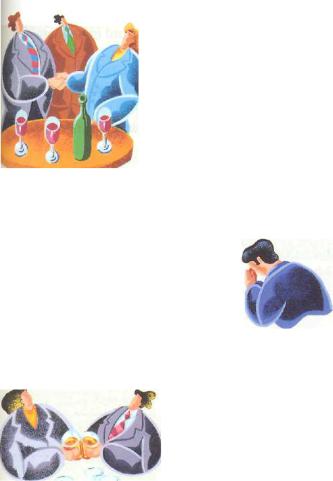
When it is handed to a person in a superior position, it must be given and received with both hands, and you must take time to read it carefully, and not just put it in your pocket! Also the bow is a very important part
of greeting someone. You should 70 not expect the Japanese to shake hands. Bowing the head is a mark of respect and the first bow of the day should be lower than when you meet thereafter.
The Americans sometimes find it difficult to accept the more formal 75 Japanese manners. They prefer to be casual and more informal, as ' illustrated by the universal 'Have a
nice day!' American waiters have a one-word imperative 'Enjoy!' The British, of course, are cool
so and |
reserved. The great topic of conversation |
|
between strangers in Britain |
|
is the weather— unemotional |
|
and impersonal. In America, |
|
the main topic between |
|
strangers is the search to |
|
find a geographical link. 'Oh, |
|
J really? You live in Ohio? I had an |
J)~ |
uncle who once worked there.' |
iJNhen in Rome, do as the Romans do.'
go Here are some final tips for travellers.
•In France you shouldn't sit down in a cafe until you've shaken hands with everyone you know.
•In Afghanistan you should spend at least five minutes saying hello.
95 • In Pakistan you mustn't wink. It is offensive.
• In the Middle East you must never use the left hand for greeting, eating, drinking, or smoking. Also, you should take care not to admire anything in your hosts' home. They will feel that they have to give it
100to you.
•In Russia you must match your hosts drink for drink or they will think you are unfriendly.
•In Thailand you should clasp your hands together
and lower your head and your eyes when you greet
105someone.
•In America you should eat your hamburger with both hands and as quickly as possible. You shouldn't try to have a conversation until it is eaten.
Comprehension check
Read the article again and answer the questions. Discuss the questions in pairs.
1 Which nationalities are the most and least punctual?
2Why did the British think that everyone understood their customs?
3Which nationalities do not like to eat and do business at the same time?
4'They (the French) have to be well fed and watered.' What or who do you normally have to feed and water?
5Look at the pictures. What nationality are they? How do you know?
6An American friend of yours is going to work in Japan. Give some advice about how he/she should and shouldn't behave.
7Imagine you are at a party in (a) England
(b)America. How could you begin a conversation with a stranger? Continue the conversations with your partner.
8Which nationalities have rules of behaviour about hands? What are the rules?
9Why is it not a good idea to ...
... say that you absolutely love your Egyptian friend's vase.
... go to Russia if you don't drink alcohol.
... say 'Hi! See you later!' when you're introduced to someone in Afghanistan.
... discuss politics with your American friend in a McDonald's.
Discussion
1 Do you agree with the saying 'When in Rome, do as the Romans do'? Do you have a similar saying in your language?
2What are the 'rules' about greeting people in your country? When do you shake hands? When do you kiss? What about when you say goodbye?
3Think of one or two examples of bad manners. For example, in Britain it is considered impolite to ask people how much they earn.
4What advice would you give somebody coming to live and work in your country?
Doing the right thing Unit 4
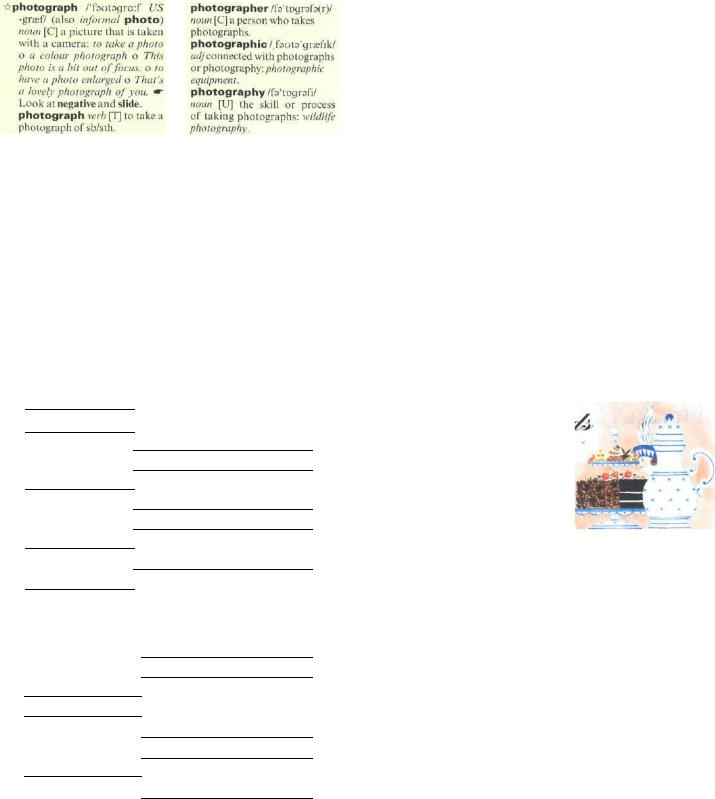
VOCABULARY AND PRONUNCIATION
Word formation
1 Look at the entry for the word photograph in the
Oxford Wordpower Dictionary.
Notice how different parts of speech (noun and verb) and words formed from the headword (photographer, photographic, photography) are given in the same entry. Is this the same in your dictionary?
Look how the stress is shown: /'fsotsgraif/. Practise saying the words in phonetic script.
2 Complete the charts with the different parts of speech. The missing words are all from the article A World Guide to Good Manners. Mark the stress.
Use your dictionary to help you with the pronunciation.
3 Rewrite the sentences, using the word in italics in a different word class.
Example
We had a long discussion about politics.
We discussed politicsfor a long time.
a |
She gave me some advice about which clothes to wear. |
||||||||||||
|
She |
|
|
|
|
_ _ _ _ _ . |
|||||||
b |
How high is that wall? |
|
|
|
|
||||||||
|
What's the |
|
|
|
|
|
_ _ _ _ _ _ 1 |
||||||
c Children should never speak to strange people. |
|||||||||||||
|
Children |
|
|
|
|
|
. |
||||||
d |
I felt that there was someone watching me. |
||||||||||||
|
I had |
|
|
|
|
|
. |
||||||
e |
We had a lot of difficulty in finding the way here. |
||||||||||||
|
It was _____ |
|
|
|
|
. |
|||||||
f My son's behaviour at the party was very bad. |
|||||||||||||
|
My son |
|
|
.....___ |
. |
||||||||
|
|
|
|
|
|
|
|
|
|
|
|
|
|
gThere are a lot of foreign people in town at the moment.
There are |
|
.. |
. |
||
|
|
|
|
|
|
h The shock made my hair turn white. |
|
||||
I was so |
|
|
|
|
. |
be haviour
ar rangement
meet ad'vise
di'scussion
feel deal
acceptance
tip
admi'ration
Adjective
foreigner shock
high
re'spectful
'difficulty
re'serve
strange
offence
LISTENING AND SPEAKING
1 Have you ever been a guest in someone's house
in a foreign country? When? Why? What happened?
2 T.29 You will hear three
people describe how they entertain guests in their country. Sumie is from Japan, Rosa is from Spain, and Leslie is from the United States.
Listen and take notes under the following headings:
-the kind of invitation, formal or informal
-the time of day
-the preparations that the host or hostess makes
-the presents that people take
-the food and drink served
3Work in small groups. Compare information. What similarities and differences are there?
4What happens in your country? Is it usual to invite people to your home for a meal? What are such occasions like in your home?
42 Unit 4 Doing the right thing
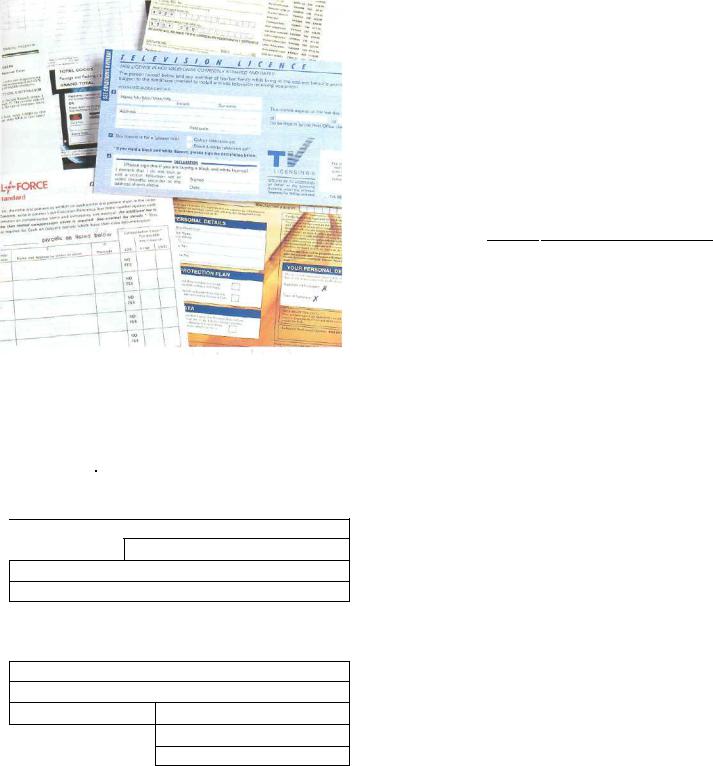
I WRITING
Filling in a form
1 Most people hate filling in forms! What occasions can you think of when you have to fill in a form? What sort of information do you have to provide?
CITY BANK ACCOUNT APPLICATION FORM
Applicant
Title |
Mr _ |
Mrs Q |
Miss H Ms |
Surname |
First name(s)
Date of birth
Country of origin
Present address
Post code
When did you move to this address?
Permanent address (if different from above)
Post code
Telephone no. (home)
Telephone no. (work)
2 Forms do not usually ask questions, but they ask for information. Match a line in A with a question in B.
A
1 First name
2Surname
3Date of birth
4Country of origin
5Present address
6Permanent address
7Marital status
8 Occupation
9 Annual income
B
aWhere do you live?
bWhat do you do?
cWhere arc you living at the moment?
dAre you married or single?
eWhat's your first name?
fHow much do you earn a year?
gWhen were you born?
hWhat's your surname?
iWhere were you born?
3 Forms ask you to do certain things. Do the following: Write your name in block capitals.
Sign your name. .
Delete where not applicable.
I am a student/an employee/an employer.
Put a cross if you are male. •
Put a tick if you are female. •
4Fill in the form. It is an application form to open a bank account.
Marital Status |
|
|
|
Single f Married L |
Divorced |
Widowed |
|
No. of dependent children \_ |
|
||
Residential details |
|
|
|
Owned \ |
|
Rented |
|
Where do you reside? |
|
||
With parents |
With a partner |
Alone |
|
Employment status |
|
|
|
Employed full-time |
Employed part-time |
||
Self-employed |
|
Unemployed |
Retired |
Income details
Annual income
Signature
Date
Doing the right thing Unit 4 43

Requests and offers
1 Match a line in A with a line in B. Who is talking to who? Where are the dialogues taking place?
aCould you fill it up, please?
bCould I have the bill, please?
cIt's a present. Do you think you could giftwrap it for me?
dTwo lagers, please.
eCan you tell me the code for Paris?
fI'll give you a lift if you like.
gWould you mind opening the window?
hCould I have extension 2387, please?
B
• Halves or pints?
]] Not at all. It's very stuffy in here.
^\ One moment. I'll just look it up.
Q Sure. Shall I check the oil as well?
~2 I'm afraid the line's engaged at the moment. Do you want to hold?
• Certainly, sir. I'll bring it straight away. Q Yes, indeed. I'll just take the price off.
Q That's great. Would you drop me at the station?
2 |
T.30 |
Listen and check your answers. Practise the |
|
dialogues, paying particular attention to intonation |
|
|
and voice range. |
|
CD Grammar Reference: page 148. |
||
3 |
T.31 |
Listen to the six dialogues. Answer the |
|
questions. |
|
aWhere are the people?
bWhat is the relationship between them? (parent and child; customer and shop assistant)
cWhat exactly are the words of the request?
Roleplay
Work in pairs. Make up a dialogue for one of these situations using the prompts given.
-A is a customer in a restaurant; B is a waiter. Prompts: table near the window; menu; wine list; ordering; clean fork; dessert; bill.
-A is going on holiday very soon; B offers to help. Prompts: pack; confirm flight; passport; travellers' cheques; look after cat; water plants.
-A is cooking a meal for twenty; B offers to help. Prompts: prepare the vegetables; check the meat; set the table; do the washing-up; open the wine.
44 Unit 4 Doing the right thing
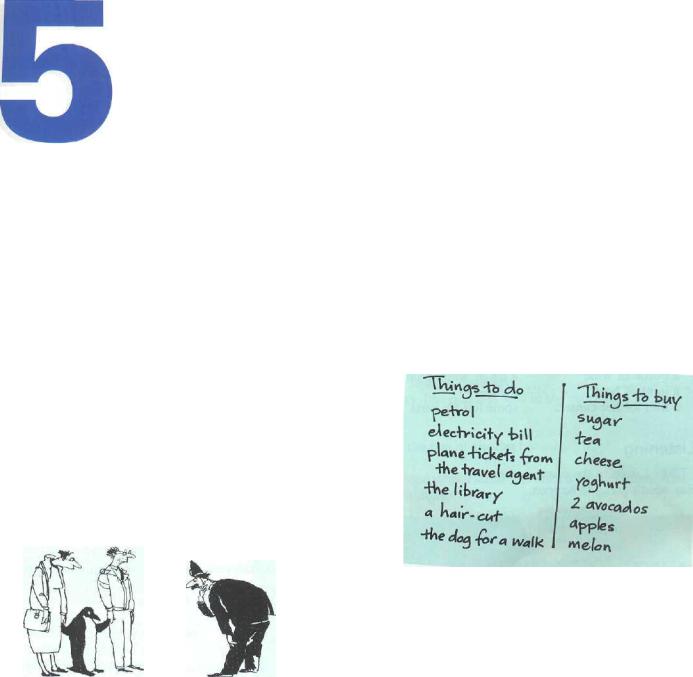
On the move
Future forms
Travelling around
PRESENTATION (1)
Test your grammar
T.32 Read and listen to the joke. Underline the verb forms that refer to the future. What is the difference between them?
going to and will
1 John always writes himself a list at the beginning of every day. What's he going to do today? What's he going to buy?
A Penguin Joke!
One day a man and his wife were walking down the street when they came across a penguin.
'Oh!' exclaimed the man. 'What a surprise! What shall we do with it?'
'I know,' said his wife. 'We'll ask a policeman.' So they found a policeman and explained what had happened.
'Mmm,' said the policeman, 'I think the best thing is to take it to the zoo.'
'What a good idea!' said the woman. 'We'll go there straight away.'
The next morning the policeman was walking down the same street when he saw the couple again with the penguin. 'I thought I told you to take that penguin to the zoo,' the policeman said. 'Well, we did,' said the man. 'We took it to the zoo and we all had a really good time. So this afternoon we're taking it to the cinema, and
this evening we're going to have a meal in a fish restaurant.'
Example
He's going to fill up the car with petrol.
2 T.33 Read and listen to the dialogue between John (J) and Anna (A).
JI'm going to the shops soon. Do you want anything?
A No, I don't think so. Oh, hang on. We haven't got any sugar left.
J It's all right. It's on my list. I'm going to buy some. A What about bread? We haven't got any bread.
J OK. I'll go to the baker's and I'll buy a loaf. A I'll be at work when you get back.
JI'll see you later, then. Don't forget Jo and Andy are coming round for a drink tonight.
A Ah, right. Bye.
J Bye, honey.
On the move Unit 5 45
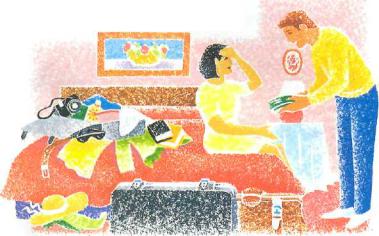
Grammar questions
I'm going to buy some (sugar).
I'llbuyaloaf.
Why does John use different future forms? What's the difference between will and going to to express a future intention?
We don't usually say going to go or going to come.
Find the examples in the dialogue where these forms are avoided.
PRACTICE
1 Dialogues
John said, I'll go to the baker's and I'll buy a loaf.
Look at the list of items. What would Anna ask? What would John say?
Example
- some stamps
Anna Could you get some stamps?
John OK. I'll go to the post office and buy some.
a newspaper |
- |
some shampoo |
a bottle of wine |
- |
a tin of white paint |
a joint of beef |
- |
a video |
a film for her camera |
- |
some felt-tip pens |
2 Listening
T.34 Listen to the conversations.
Say what's going to happen.
Example
AHave you seen the air tickets?
BYes. They're with the travellers' cheques.
AAnd do you have the address of the hotel?
B No. |
I've just got |
the |
name. |
Do |
|
A |
No. Maybe not. The taxi driver will know. |
|
|||
R |
What about the milk? Have you cancelled the milk? |
||||
AYes. No milk for a fortnight. Right?
BThat's it. Well done.
3 I think I'll...
1 Use the prompts in A to make sentences with / think
... will. Match them with a sentence in B.
Example
/ think Jeremy will win the match. He's been playing really wellrecently.
A
aJeremy/win the match
bit/be a nice day tomorrow
cI/pass my exams
dyou/like the film
ewe/get to the airport in time
fyou/get the job
B
] But we'd better get a move on.
] He's been playing really well recently.
] The forecast is warm and dry.
] You've got all the right qualifications.
] It's a lovely story, and the acting is superb.
] I've been revising for weeks.
2Now make sentences with / don't think ... will with the words from A in Exercise 1. Match them with a sentence in C.
Example
I don't think Jeremy will win the match. He hasn't practisedfor ages.
C |
|
] |
There's too much traffic. |
] |
I haven't done any revision at all. |
] |
The forecast said rain and wind. |
]He |
hasn't practised for ages. |
] |
You're too young and you've got no experience. |
] |
It's not really your cup of tea. |
They're going to catch a plane.
They're going to stay in a hotel.) we need the address?
They're going to be away for two weeks.
46 Unit 5 On the move

3 Make true sentences about you.
Example I/bath tonight
/ think I'll have a bath tonight// don't think I'll have a bath tonight.
-it/rain tomorrow
-I/go shopping this afternoon
-I/be a millionaire one day
-I/eat out tonight
-we/have a white Christmas
-the teacher/give us a lot of homework
4 Grammar
Underline the correct verb form in the sentences.
Example
'Oh. dear. I'm late for work.' 'Don't worry. I'm going to give! I'll give you a lift.'
a'I've got a headache.'
'Have you? Wait a minute. /'// get/I'm going to get you an aspirin.'
b'It's Tony's birthday next week." 'Is it? I didn't know. I'll send/I'm going to send him a card.'
c'Why are you putting on your coat?'
'Because /'// take/I'm going to take the dog for a walk.'
d'Are you and Alan still going out together?'
'Oh, yes. We'll get married! We're going to get married next year.'
c(a telephone conversation}
'Would you like to go out for a drink tonight?'
77/ watch/I'm going to watch the football on television.'
'Oh! I didn't know it was on.' 'Come and watch it with me!' 'OK. I'll come/I'm going to come round at about 7.30.'
f 'Did you phone Peter about tonight?'
'No, I forgot. I'll do/I'm going to do it now. What's his number?'
PRESENTATION (2)
Present Continuous
1 Nina Kendle works in the fashion business.
Look at her diary for today. Imagine it is 9.30 in the morning.
-Where is she now? What's she doing?
-What are her plans for the rest of the day?
2 T.35 Listen to a telephone conversation between a businessman, Alan Middlcton, and Nina Kendle's secretary.
On the move Unit 5 4-7
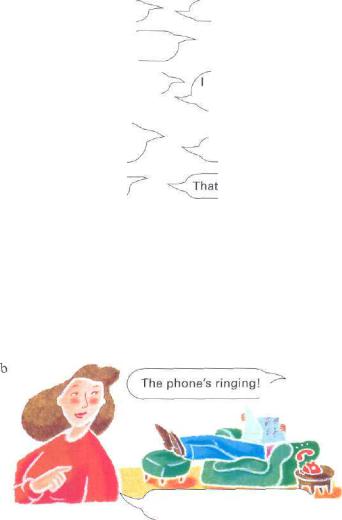
3 Look at the conversation between Nina Kendle's secretary (S) and Alan Middleton (A). Try to complete the gaps.
S Hello. Nina Kendle's office.
AHello. Could I speak to Nina Kendle, please? This is Alan Middleton.
S Oh, I'm afraid she's out at the moment.
She (a) |
|
|
|
|
|
a factory. |
||
A I see. What time (b) |
|
|
she |
|||||
. |
|
|
. |
___ back in the office? |
||||
|
|
|
|
|
|
|
|
|
S I'm not sure. I don't know how long she's going to stay there.
A All right. What about lunch-time? Is she free then?
S |
Just one moment. I (c) |
|
|
_____ check. |
|||||
|
|
|
|
|
|
|
|
|
|
|
No, she (d) |
|
|
|
|
lunch with a |
|||
|
designer. |
|
|
|
|
|
|
|
|
A Till what time? Do you know? |
|
|
|||||||
S |
Erm ... Well, she (e) |
|
|
|
a customer |
||||
|
|
|
|
|
|
|
|||
|
here in her office at 2.00. |
|
|
|
|
||||
A Ah! So when's a good time to try again? |
|||||||||
S Any time after 2.30. |
|
|
|
|
|||||
A |
Are you sure? |
|
|
|
|
|
|
|
|
S |
Definitely. She |
(f) |
in her office |
||||||
|
for the rest of the afternoon. |
||||||||
|
|
|
|||||||
A |
OK. 1 |
(g) |
phone back then. |
||||||
|
Thank you. |
|
|
|
|
|
|
|
|
S That's all right. Goodbye.
Look at the Tapescript on page 131 and check your answers.
•Grammar questions
-What tense are the verbs in a, d and e?
Which refer to the present? Which refer to the future?
- Why are these sentences with will, not going to?
I'll check.
I'll phone back then.
• Read the Language Review on page 49.
PRACTICE
1 Roleplay
Work in pairs. Your teacher will give you a role card. Study the information on it carefully. Have telephone conversations similar to the one between Alan Middleton and Nina Kendle's secretary.
Remember the following expressions.
Could I speak to ... ? |
I'm afraid ... |
|
|||||
What time will ... be back? |
\ |
At about ... |
_ • |
||||
|
|
|
|
. |
|||
|
|
|
|
|
|
||
Is ... free at lunch-time? |
'II check. No, she's |
||||||
|
|
|
having/seeing/going |
||||
When's a good time |
|
|
|
|
|
||
to try again? |
She'll be ... |
|
|||||
"*_ |
|
|
|
|
|
|
|
I'll phone back ... |
's fine ... j |
|
|||||
2 Discussing grammar
Work in pairs and discuss your answers. Underline the correct verb form.
Example
I must hurry because I'm going/I'll go to the doctor's.
aAre you doing/ Will you do anything tonight? Would you like to come round for a game of cards?
- %
OK. / answer/I'll answer it. )
c'I've just booked our summer holiday' 'Really? Where are you going/will you goT
' We go/We're going to Spain.'
d'There's a good film on at the cinema tonight. Are you interested?'
'Yes, I am.'
'Great! I'll see/I'm seeing you outside the cinema at 7.30.'
eDo you think it's raining/it'll rain this afternoon?
f'We're having/We have a party next Saturday' 'Who are you going to invite/do you invite!"
'Just a few friends. Can you come?'
'I'd love to, but I'll go/I'm going away for the weekend. Thanks, anyway'
48 Unit 5 On the move

3 Arranging to meet
1 Imagine it is Friday morning. You need to arrange to meet someone over the weekend. First, fill in your diary. What are you doing this weekend? When are you free?
Friday
morning |
afternoon |
evening |
|
Saturday
morning |
afternoon |
evening |
Sunday
morning aftt evening
LANGUAGE REVIEW
Future forms
will
1 Will expresses an intention or decision made at the moment of speaking.
I'll give you my phone number. Ring me tonight. I'll check her diary for you.
I'llphone back later.
Many languages express this idea with a present tense, but *I givc^ *I check and *i phone are wrong.
2 The most common use of will is to refer to the future. It expresses a future fact or prediction.
Tomorrow will be warm and sunny
What time will she be back?
I'm sure you'll pass your exam.
going to
1 Going to expresses an intention or decision thought about before the moment of speaking. It expresses a plan.
We're going to have a holiday in Sicily this summer.
My daughter's going to study modern languages at
BristolUniversity.
2We use going to when we can see evidence now that something is certain to happen.
Look at those clouds. It's going to rain.
Present Continuous
The Present Continuous can be used to express a future arrangement between people. It is common with verbs such as go, come, see, visit, meet, have (a party), leave.
Pat and Peter are comingfor a meal tonight. We've having salmonfor supper.
Sometimes there is little or no difference between a future intention {going to) and a future arrangement (Present Continuous).
We're going to see a play tonight.
We've seeing a play tonight.
Iu-Q Grammar Reference: page 148.
2Work in pairs. First decide why you want to meet. Is it for business, or to go out together somewhere? Consult your diary and try to find a time and a place to meet.
On the move Unit 5 49
